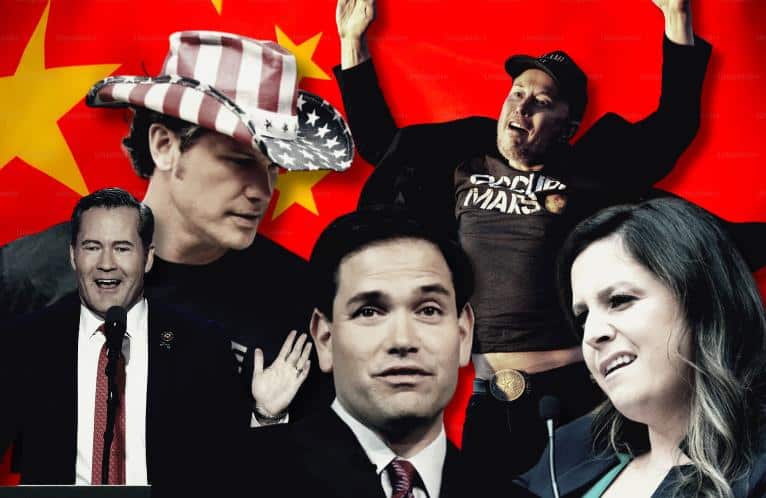Trump’s China People: A Reader
- Analysis
 Miranda Wilson
Miranda Wilson  Nick Zeller
Nick Zeller- 11/22/2024
- 0

Trump’s Cabinet and Staff nominations so far promise a more hostile approach towards China and a more pro-war position than those who voted for Trump as a peace candidate might like. Between a Secretary of State who might not be allowed into the country and a U.N. Ambassador who signals extreme distrust towards the Chinese Communist Party, U.S.-China relations will continue their course of decline.
Trump has threatened to put a 60% tariff on all goods imported to the United States from China, potentially harming China’s economy and raising prices for American consumers. In 2022, the United States imported over $530 billion in goods from China. Such a tariff policy could cause China to reciprocate, imposing its own tariffs and sparking another trade war. Trump’s trade policy during his first presidency is estimated to have cost the United States almost a quarter of a million jobs.
In an interview earlier this month with the Wall Street Journal, Trump shared more of his opinions on China. He claimed:
We have the power to get them to be fair. I think we have a lot of power over China economically. I think our big power over China is economic. If we ever threatened to stop being nice to them economically, meaning, you know, where they can sell their goods to us, we have tremendous power. We don’t use the power.
Based on Trump’s first presidency and the promises he has made so far, he is likely to use economic leverage against Beijing. And, based on his Cabinet and Staff picks so far, they are likely to back him up. Except for maybe one: Elon Musk.
Aside from Musk and Michael Waltz, all other potential picks mentioned below require Senate confirmation. His nominations and their status can be tracked here.
Secretary of State: Marco Rubio
Florida’s Marco Rubio, who has held his seat in the U.S. Senate since 2011, has declared that China is the “gravest threat facing America today.” In 2022, during a speech to The Heritage Foundation, he claimed the threat of China takes precedence over “climate change, the pandemic, or the Left’s version of social justice.” The speech is worth reading in its entirety, but the overarching theme is Rubio’s extraordinarily hawkish stance toward China.
His Senate biography confirms his contentious stance towards China: “Senator Marco Rubio is leading the charge to rebalance our relationship with Communist China. He was the first to raise the alarm on various venues for Chinese influence campaigns in the U.S., from the National Basketball Association to Confucius Institutes at public universities to TikTok.” His Senate page lists his goals for China relations as “defending human rights,” “protecting advanced technology,” and “groundbreaking research,” such as his 328-page report on the origins of COVID-19.
His presentation at The Heritage Foundation also gives insight into his potential policies towards China. He suggests four tactics: encouraging a unified attitude towards China, taking national security measures to counter espionage attempts, revitalizing American industrial policy, and empowering allies, of which he specifically mentions Taiwan, Japan, Korea, and India.
Overall, he believes the U.S. needs “a whole-of-society effort to rebuild our country, overcome the China challenge, and keep the torch of freedom lit for generations to come.” However, overcoming the “China challenge” might not be possible through visits to Beijing. In 2020, Rubio was sanctioned twice by the Chinese government for pushing back against repression in Hong Kong and Xinjiang. Unless the sanction is lifted, he will be the first Secretary of State unable to conduct diplomacy by visiting China.
An excerpt from Rubio’s Heritage Foundation speech:
They don’t believe in concepts such as “universal rights,” “global engagement,” and “international law” — all these terms that are thrown around. Because their geopolitics reflects human nature. They believe in raw power. They believe because they are a big country, their smaller neighbors must be their tributaries. And they believe the only way for them to become more powerful is to make others weaker, particularly America. This is the raw, unvarnished truth about the Chinese Communist Party. And the biggest geopolitical blunder of the last quarter century was the naive, bipartisan, widely held belief that free trade and globalization alone could change all of this, and in particular could change them. As a consequence of that blunder, we did nothing while for over two decades, China has methodically undermined our economic strength by stealing critical technology, manufacturing capacity, and jobs. We did nothing while they destroyed our social cohesion by luring away those jobs, and as a result hollowing out once-vibrant cities and communities. We did nothing as they used a corporate lust for quarterly profits to infiltrate every segment of American society, from government and business to academia and entertainment. And we do nothing as they flood our cities with Fentanyl in this century with results reminiscent of the opium crisis in Chinese cities in the 19th century.
Secretary of Defense: Pete Hegseth
Pete Hegseth has been a political commentator for Fox News since 2014 and is a former Army National Guard Officer. His stance towards China can be gleaned from his statements on Fox News as well as appearances on podcasts like the Shawn Ryan Show.
As Defense Secretary, Pete Hegseth is likely to make large reforms to the military in order to combat his view of China’s army and other threats. He has claimed that his reform to the Department of Defense will be a “frontal assault” and will include purging “woke” generals. He plans to make use of the “real threat of violence” in order to assert the United States as a global power.
On a podcast, he said, “I think our biggest threat is internal. I think we’re committing cultural suicide, and we’ve lost complete focus on the basics and building blocks of what made Western civilization in America exceptional, fruitful, prosperous, strong, free.”
On the “Man of War” podcast with Rada Conde he asserted, “At least under Trump, there were missiles falling on terrorists’ heads. They knew he meant business. Kim Jong Un, even though it didn’t work, knew Trump meant business. Fire and fury was a real thing. Uncertainty is a real thing. The real threat of violence is a real thing, and none of that exists under these globalists who think they can sanction their way.”
Considering Hegseth views China as a military threat, it is possible that such military reforms will coincide with an increased strongman position towards China.
His nomination is controversial due to a sexual assault allegation filed against him in 2017. On the matter, Hegseth saidhe was “fully investigated” and “completely cleared.” Hegseth nonetheless paid his accuser an unknown settlement in exchange for signing a nondisclosure agreement. Matt Gaetz, Trump’s original pick for Attorney General, withdrew from consideration due to surmounting evidence of sexual assault allegations and an investigation by the House Ethics Committee. What Gaetz’s decision to withdraw will mean for Hegseth is unclear.
An excerpt from Hegseth’s appearance on the Shawn Ryan Show:
The Pentagon has a perfect record in all of its war games against China: we lose every time… I mean the military industrial complex, the way we procure weapons systems… you know we're always… the way our system works, the way our bureaucratic system works… the speed of weapons procurement…we're always a decade behind in fighting the last war. Whereas China, they're… China's building an army specifically dedicated to defeating the United States of America. That is that is their strategic outset. Take hypersonic missiles… if our whole power projection platform is aircraft carriers… and yeah we have a nuclear triad and all of that, but… if, you know, 15 hypersonic missiles can take out our 10 aircraft carriers in the first 20 minutes of a conflict… what does that look like? … If they've already got us by the balls economically, uh, which you pointed out…with our grid… culturally… there's plenty of elite capture going on around the globe… and then microchips and everything… Why do they want Taiwan? They want to corner the market completely on the technological future… we can't even drive our cars without the stuff we need out of China these days… they have a full spectrum, long-term view of not just regional but global domination, and we are we have our heads up our asses.
U.N. Ambassador: Elise Stefanik
Elise Stefanik is the U.S. representative for New York’s 21st congressional district and chair of the House Republican Conference. Stefanik has limited foreign policy experience and has been openly critical of the United Nations, especially on its criticism of Israel.
The Washington Post referred to Stefanik as a “fierce China critic.” They predict Stefanik will “face a body in which China, a permanent Security Council member, has rapidly built influence on key global issues.”
On her website, Stefanik often reproves China. In October 2024, she published a statement responding to alleged Chinese influence in U.S. elections. In the statement, she asserts, “Communist China’s blatant and malicious election interference against the leading candidate for President of the United States, President Donald J. Trump, is absolutely unacceptable. The Biden-Harris Administration must immediately condemn this illegal action taken by Xi Jinping and hold the CCP accountable.”
In another statement targeting the CCP, Stefanik responded to a report by the Washington Free Beacon, a notoriously conservative journal. The report detailed an investigation by the House Select Committee on the CCP which claimed Harvard played a role in exacerbating China’s “transnational repression” on its campus.
Stefanik’s statement on the events at Harvard:
Once again, Harvard has proven to be completely corrupted by adversarial foreign influence. Harvard is kowtowing to Communist China and as a senior member of the House Education and the Workforce Committee I will continue working to root out foreign control over our college campuses. We cannot allow American institutions of higher education to serve as tools for Communist China to carry out its transnational repression. I look forward to working with Chairman Moolenaar and Chairwoman Foxx to hold Harvard accountable and to end Communist China’s infiltration of American universities.
Referring to China as “Communist China” and using the language of “kowtowing” not only has undertones of racism but leaves little confidence for her willingness to work with China on Security Council resolutions.
Stefanik advocating her Countering CCP Drones Act:
National Security Advisor: Michael Waltz
Michael Waltz is the U.S. representative for Florida’s 6th congressional district and a colonel in the United States Army.
He recently co-authored with Matthew Kroenig, vice president of the Atlantic Council, a piece for The Economist titled “China is the big winner from Biden’s foreign policy.” They write, “The next president should act urgently to bring the conflicts in Ukraine and the Middle East to a swift conclusion, and finally focus strategic attention where it should be: countering the greater threat from the Chinese Communist Party.”
Waltz is significantly in favor of promoting Taiwan’s security, as elucidated in The Economist article and in his book published earlier this year. The book, titled Hard Truths: Think and Lead Like a Green Beret, lays out a five-part strategy to preventing war with China, including arming Taiwan faster, re-assuring allies in the Pacific, and modernizing planes and ships, according to Reuters.
Aside from Taiwan, he is critical of China’s human rights record. In 2022, he called for a U.S. boycott of the Winter Olympics in Beijing due to its mistreatment of Uyghur Muslims and its ties to the origin of COVID-19.
An excerpt from Waltz’s Economist article with Kroenig:
China has benefited from a confusing American policy towards it. President Biden said he would defend Taiwan, only to have his own staff walk him back four times on the issue. America is not building armed forces to deny a Chinese attack on Taiwan. It has cut defence spending in real terms, allowing the balance of power to shift in China’s favour. More importantly and less noticed, China has been the biggest beneficiary of American deterrence failures and ongoing conflicts in Europe and the Middle East. The Biden administration had initially promised to put relations with Russia on a “stable and predictable footing” and to pacify the Middle East by re-entering the Iran nuclear deal, in order to focus on China. This approach has led to the opposite outcome. Washington is bogged down in wars in Europe and the Middle East that distract from the China challenge. The administration was not simply unfortunate to have conflicts erupt on its watch. Its policies led directly to deterrence failures. American generals testify that the disastrous withdrawal from Afghanistan contributed to Vladimir Putin’s decision to invade Ukraine. When Russia massed forces on Ukraine’s borders in 2022, President Biden could have deterred the Russian leader by threatening catastrophic consequences. Instead, he reassured him, ruling out a military response and suggesting acceptance of a “minor incursion”. Mr Putin then launched the biggest conflict in Europe since the second world war. Now, American munitions and defence production are aiding Ukraine instead of deterring Chinese aggression in the Indo-Pacific. The attention of American and allied leaders is focused on Europe instead of China. Lloyd Austin, the secretary of defence, has led two dozen international meetings of the Ukraine Defence Contact Group. On top of that, poorly designed sanctions on Russia prevent Western countries from buying Russian oil and gas,but permit China to snap up energy resources at a discounted rate. The sanctions have transferred billions of dollars of wealth from Russia to China. … A new administration should increase defence spending and revitalise the defence-industrial base to make sure its armed forces are clearly capable of denying a Chinese attack on Taiwan. Mr Trump proudly contrasts the peace of his first term with the wars of the Biden-Harris years. By following the plan described above, the next president can end ongoing conflicts and restore deterrence, global stability and peace.
Elon Musk: Government Efficiency
In terms of cooperative U.S.-China relations, Elon Musk might be the surprising light at the end of the tunnel. As noted by ABC, “Musk has deep business interests in China and could become a key middleman for dialogue between Trump and China’s Xi Jinping.”
Musk is treated well by officials in China when he visits, and half of Tesla’s cars are made in the country. Further, Musk has called Taiwan an “integral part of China,” echoing the stance of the CCP.
In April, Musk visited China to meet with Premier Li Qiang, who claimed Tesla was a positive example of cooperation between Beijing and Washington. In a post on X, Musk said he was “honored” to meet with Premier Li.
Musk has previously shown concern over tensions between China and the United States, and criticized the Biden administration for raising tariffs on Chinese EVs to 100% this year. He explicitly favors “no tariffs” on Chinese EVs.
As co-leader of the new government efficiency panel, will his desire to maintain business in China clash with Trump’s plans to massively increase tariffs on imports from China? Once Trump takes office, Beijing will likely be watching how Musk’s business priorities interact with the other Cabinet members’ hawkish attitudes.
Miranda Wilson is a contributing editor for the U.S.-China Perception Monitor.
Nick Zeller is editor of the U.S.-China Perception Monitor and a senior program associate at The Carter Center’s China Focus iniative.
The views expressed in this article represent those of the author(s) and not those of The Carter Center.







